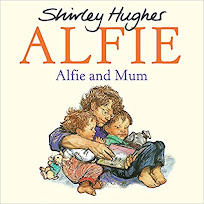Shirley Hughes, whose beautifully-illustrated books have delighted
countless children (and their parents) for many years, was born in West Kirby
on The Wirral, in July 1927. As a child
she adored comics, with their exciting stories told in comic strips, and was inspired
by the work of Heath Robinson, whose complicated technical drawings of his
incredible machines fascinated her, and by the great book illustrators Arthur
Rackham, Edward Ardizzone and E H Shepherd.
She also enjoyed frequent theatre visits with her mother, which gave her a love of observing people and a desire to create. Leaving school she went to the nearby Liverpool School of Art to study drawing and costume design, with a vague idea of designing costumes for the theatre. However, after a year she decided to move to Oxford, to the Ruskin School of Drawing and Fine Art, where she was encouraged to work in the picture book format, and after graduating she briefly tried working at Birmingham rep, which decided her that the theatre world was not for her. It was then that she took her tutor’s advice and began working as an illustrator.
After art school she moved to London, and in 1952, she
married John Vulliamy, an architect and etcher, and had three children. Her daughter, Clara Vulliamy, is now also a
children’s book illustrator. Shirley
Hughes lived in London for the rest of her life. She died in February of this year, aged 94.
I first discovered Shirley Hughes’ inimitable illustrations
when reading My Naughty Little Sister,
by Dorothy Edwards, to my own children, and was very impressed by how lifelike the
small children in the illustrations were.
She also illustrated The Bell Family by Noel Streatfeild before trying her hand at writing and illustrating her own books. Her first published book was Lucy and Tom’s Day, which was made into a series of stories. She went on to write over fifty more stories, including Dogger (1977), the story of a small boy who loses his toy dog, which won the Kate Greenaway Medal as the year's best children's book illustration by a British subject. In 2007, to celebrate the 70th anniversary of the Carnegie Medal, Dogger was also named the public favourite of the top ten Greenaway Medal-winning works, or Greenaway of Greenaways.
Other great favourites are the Alfie series (1977), featuring a young boy named Alfie and sometimes his sister Annie-Rose. I read these books to my children too, and they have gone on to read them to their children, and the stories have lost none of their magic.
In 2003 she won a second Greenaway (no illustrator has won three) for Ella's Big Chance, her own adaptation of Cinderella, set in the 1920s.
Throughout her career she illustrated 200 children's books,
which sold more than 10 million copies.
In 1984, she won the Eleanor Farjeon Award for
distinguished service to children's literature, in 1999 she was awarded
an OBE, and in 2000 she was made a Fellow of the Royal Society of
Literature.
In 2003 the Walker Art Gallery in Liverpool hosted an
exhibition of her work, which then moved to the Ashmolean Museum in Oxford.
In 2004 ahe was also granted an Honorary Fellowship by Liverpool
John Moores University and in 2012 Honorary Degrees by the University
of Liverpool and the University of Chester.
In 2015 Booktrust, the UK's largest reading charity, awarded
her their first lifetime achievement award.
And in the 2017 New Year Honours, she was awarded a CBE for
services to literature.
Article about Shirley Hughes published in the New Statesman magazine at the time of her death:
No one since Rembrandt has so perfectly captured
the precarious half-balance of the toddler's toddle. And I don't think anyone
ever has depicted ordinary domestic mess so honestly...The parents were also
always present in the story – something unusual in children's books. Even more
unusual, the siblings in her stories are often really good – even gallant – to
each other. The neighbourhood is warm and friendly and multicultural. Her world
is our world at its best. The mess and the frizz have their place within a
bigger conviction that stories about ordinary children doing ordinary things –
getting locked out, losing a toy – could be just as full of courage, wonder and
grace as any epic of fairyland.
A fitting epitaph for a great talent.









3 comments:
Thank you so much for this. I love Shirley Hughes' work so much, and I really feel she helped me be a better parent. Her books are so attentive to and respectful of the real problems and joys and dramas of a small child. The quote you give at the end is wonderful.
Thanks, Anne - yes, I really enjoyed writing this, as I have a huge admiration for her work!
What an incredible career!
Post a Comment